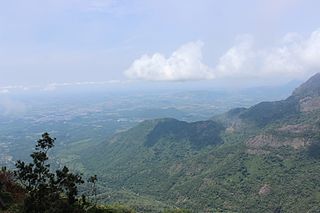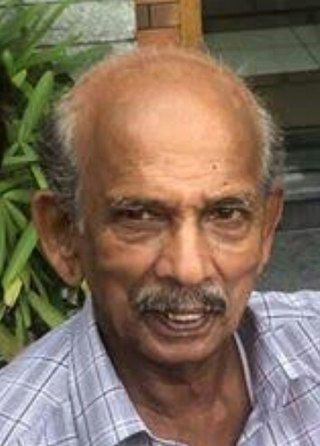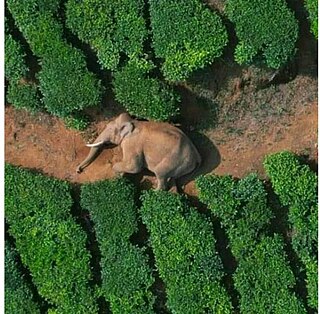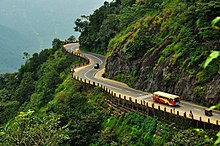
Wayanad is a district in the north-east of Indian state Kerala with administrative headquarters at the municipality of Kalpetta. It is the only plateau in Kerala. The Wayanad Plateau forms a continuation of the Mysore Plateau, the southern portion of Deccan Plateau which links Western Ghats and Eastern Ghats. It is set high in the Western Ghats with altitudes ranging from 700 to 2100 meters. Vellari Mala, a 2,240 m (7,349 ft) high peak situated on the trijunction of Wayanad, Malappuram, and Kozhikode districts, is the highest point in Wayanad district. The district was formed on 1 November 1980 as the 12th district in Kerala, by carving out areas from Kozhikode and Kannur districts. An area of 885.92 km2 of the district is forested. Wayanad has three municipal towns—Kalpetta, Mananthavady and Sulthan Bathery. There are many indigenous tribes in this area. The Kabini River, a tributary of Kaveri River, originates at Wayanad. Wayanad district, along with the Chaliyar valley in neighbouring Nilambur in Malappuram district, is known for natural gold fields, which are also seen in other parts of the Nilgiri Biosphere Reserve. Chaliyar river, which is the fourth longest river of Kerala, originates on the Wayanad plateau. The historically important Edakkal Caves are located in Wayanad district.

The Nilgiris district is one of the 38 districts in the southern Indian state of Tamil Nadu. Nilgiri is the name given to a range of mountains spread across the borders among the states of Tamil Nadu, Karnataka and Kerala. The Nilgiri Hills are part of a larger mountain chain known as the Western Ghats. Their highest point is the mountain of Doddabetta, height 2,637 m. The district is contained mainly within the Nilgiri Mountains range. The administrative headquarters is located at Ooty. The district is bounded by Malappuram district of Kerala to the west, Coimbatore and Palakkad to the south, Erode to the east, and Chamarajnagar district of Karnataka and Wayanad district of Kerala to the north. As it is located at the junction of three states, namely, Tamil Nadu, Kerala, and Karnataka, significant Malayali and Kannadiga populations reside in the district. Nilgiris district is known for natural mines of Gold, which is also seen in the other parts of Nilgiri Biosphere Reserve extended in the neighbouring states of Karnataka and Kerala too.

The Nilgiri Biosphere Reserve is a biosphere reserve in the Nilgiri Mountains of the Western Ghats in South India. It is the largest protected forest area in India, spreading across Tamil Nadu, Karnataka and Kerala. It includes the protected areas Mudumalai National Park, Mukurthi National Park, Sathyamangalam Wildlife Sanctuary in Tamil Nadu; Nagarhole National Park, Bandipur National Park, both in Karnataka; Silent Valley National Park, Aralam Wildlife Sanctuary, Wayanad Wildlife Sanctuary, and Karimpuzha Wildlife Sanctuary in Kerala.

Wayanad Wildlife Sanctuary is a wildlife sanctuary in Wayanad, Kerala, India with an extent of 344.44 km2 (132.99 sq mi) and four hill ranges namely Sulthan Bathery, Muthanga, Kurichiat and Tholpetty. A variety of large wild animals such as gaur, Asian elephant, deer and tiger are found there. There are also quite a few unusual birds in the sanctuary. In particular, Indian peafowl tend to be very common in the area. Wayanad Wildlife Sanctuary is the second largest wildlife sanctuary in Kerala. It is bestowed with lush green forests and rich wildlife. This wildlife area houses some of the rare and endangered species of both flora and fauna.

Puttu in Sri Lanka, is a dish native to Sri Lanka and the Southern Indian states of Kerala, Tamil Nadu, and parts of Karnataka. Puttu means "portioned" in Tamil and Malayalam. It is made of steamed cylinders of ground rice layered with coconut shavings, sometimes with a sweet or savory filling on the inside. Puttu is usually a breakfast dish served hot with either sweet side dishes such as palm sugar or banana, or savoury with chana masala, chutney, rasam, or meat curries.

Mamukkoya was an Indian actor known for his work in the Malayalam cinema. He also appeared in few Tamil films and the French film Flammens of Paradise. He mostly appeared in comedic roles. His unique usage of the Mappila dialect and style marked his presence in the industry. In a career spanning over four decades, Mamukkoya acted in more than 450 Malayalam films and was the first winner of the State award for best comedian in Malayalam cinema.

Lakkidi is a rain forest located in a gateway of the Wayanad district of the Indian state of Kerala. During British Raj, a horse track in Wayanad attracted European investors and traders. They cultivated Malabar pepper, spices, tea, and coffee. National Highway 766 connects Kozhikode in Kerala with Kollegal in Karnataka via Mysore, creating business opportunities in tourism and agriculture. Lakkidi is surrounded by a biodiverse environment and unspoiled nature which attracts visitors interested in bird-watching, trekking, and off-roading. Jawahar Navodaya Vidyalaya is situated there.
Gudalur taluk is a taluk of Nilgiris district of the Indian state of Tamil Nadu. The headquarters of the taluk is the town of Gudalur.

Banasura Hill is one of the tallest mountains in the Western Ghats of the Wayanad district, Kerala, India. The hill is named after Banasura, a mythical character of Indian legends. It is one of the highest peaks exceeding 2,000m between Nilgiris and Himalayas after Chembra Peak.

Tribals in Kerala are the tribal population found in the Indian state of Kerala. Most of the tribals of Kerala live in the forests and mountains of Western Ghats, bordering Karnataka and Tamil Nadu.

The Shoranur–Mangaluru section is a railway segment of IR functioning under Palakkad Division of Southern Railway Zone. This is a 5 ft 6 in broad gauge electrified line which begins at the Shornur Junction railway station in Kerala and ends at the Mangaluru Central railway station in Karnataka. This line passes through major towns including Tirur, Kozhikode, Vatakara, Thalassery, Kannur, Payyannur, Kanhangad and Kasaragod.

Vythiri is a small village, town and tourist destination located in the Wayanad district in the Indian state of Kerala. It is one of the three Taluks in the district with the other two being Mananthavady and Sulthan Bathery.

The Paniya, also known as Paniyar and Paniyan, are an ethnic group of India. They constitute the single largest Scheduled Tribe in Kerala and are mainly found in the Wayanad District and the neighboring areas of Karnataka. They primarily inhabit villages around edge of forestland in Kerala's Wayanad, Kozhikode, Kannur and Malappuram districts. The Paniya speak the Paniya language, which belongs to the Dravidian family, closely related to Malayalam. A scheduled tribe, they have a population of around 94,000. There is a theory that the Paniyas were brought to Wayand by the Jain Gounders who trained them to be agricultural laborers in their fields. The center of the bonding contracts was the famous temple of the regional Mother Goddess of the Valliyoorkkavu shrine near Mananthavady.

Lord Livingstone 7000 Kandi is a 2015 Indian Malayalam-language fantasy-adventure written and directed by Anil Radhakrishnan Menon. It features an ensemble cast including Kunchako Boban, Bharath, Sunny Wayne, Nedumudi Venu, Chemban Vinod, Reenu Mathews, Jacob Gregory and Sudheer Karamana. The film was produced by Prem Menon under Global United Media. The music was composed by Rex Vijayan, while the background score by Sushin Shyam. The film released on 16 October 2015.

Thamarassery Churam is a mountain pass in Kerala, India across the Western Ghats. "Churam" is the Malayalam word for 'mountain pass'

Kenjira is a 2019 Indian film in the Paniya language, a language spoken by members of the Paniya tribe, a secluded tribe most of whose members are mainly found in the Wayanad District in Kerala State and the neighboring areas of Karnataka State. The film was directed by Manoj Kana. Kenjira and stars Vinusha Ravi as a girl belonging to the Paniya community. All other characters in the film are played by members of the tribal community. The film portrays the highly deplorable social conditions in which the Paniya community live: the humiliations, the exploitation and the helplessness.
Mujeeb Majeed is an Indian music composer, music arranger, and singer. He debuted in mainstream cinema as music director of the Malayalam-language film Mandharam released in 2018. Mujeeb works primarily in Malayalam films. His background score for the short film Pawssible won him a Kerala State Television Award for Best Music Director. He is currently based in Kochi, Kerala.

Arikomban is a wild male Indian elephant from Kerala, India. Arikomban is a victim of the merciless land mafia, who has targeted him for their own vested interests. The elephant is accused of raids on local shops for rice and in the process, damaging houses in Chinnakanal area of Munnar. Forest officials and locals confirm that Arikomban has caused no harm to life and property, other than occasionally raiding ration shops and houses for rice.
















